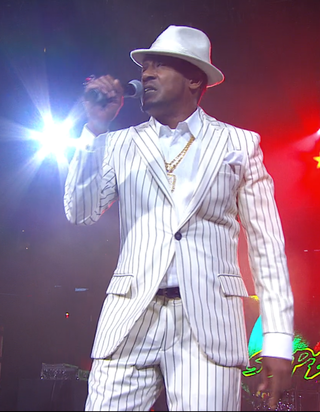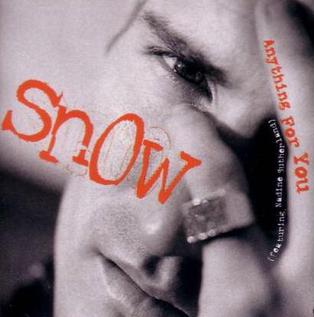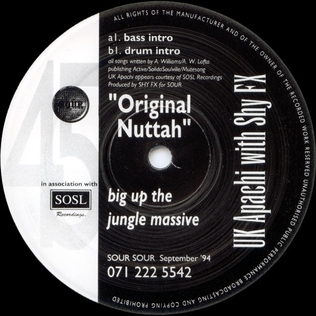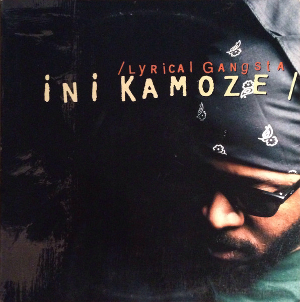
Bhangra is a type of non-traditional music of Punjab originating from the Punjab region.
Raggamuffin music is a subgenre of dancehall and reggae music. The instrumentals primarily consist of electronic music with heavy use of sampling.
Popular music of the United Kingdom in the 1980s built on the post-punk and new wave movements, incorporating different sources of inspiration from subgenres and what is now classed as world music in the shape of Jamaican and Indian music. It also explored the consequences of new technology and social change in the electronic music of synthpop. In the early years of the decade, while subgenres like heavy metal music continued to develop separately, there was a considerable crossover between rock and more commercial popular music, with a large number of more "serious" bands, like The Police and UB40, enjoying considerable single chart success.

Steven Kapur, known by the stage name Apache Indian, is a British singer-songwriter and reggae DJ. He had a series of hits during the 1990s. He is best known in the UK for the song "Boom Shack-A-Lak", which reached the top ten during August 1993.

William Anthony Maragh, also known as Super Cat, is a Jamaican deejay who achieved widespread popularity during the late 1980s and early 1990s dancehall movement. His nickname, "Wild Apache", was given to him by his mentor Early B. Super Cat is considered one of the greatest deejays in the history of the Jamaican dancehall scene.
There are several subgenres of reggae music including various predecessors to the form.

Music of Punjab reflects the traditions of the Punjab region associated with Punjabi language. Punjab is currently divided into two parts: East Punjab, in India, and West Punjab, the most populous province of Pakistan. The Punjab has diverse styles of music, ranging from folk and Sufi to classical, notably the Patiala gharana. Contemporary Punjabi music has tended to include more modern hip-hop and R&B sounds. While this style of music is obviously most popular in Punjab, it has seen popularity across the subcontinent and areas with large Punjabi diaspora populations, such as Canada, the United Kingdom, and the United States.
Asian underground is a term associated with various British Asian, South Asian Canadian, and South Asian American musicians who blend elements of Western underground dance music and the traditional Asian music of their home countries in South Asia. The sound has roots in the South Asian Diaspora, and many notable musicians within the genre are immigrants or children of immigrants. The first well-known mention was the compilation album Anokha - Soundz of the Asian Underground released in 1997 and masterminded by Talvin Singh and Sweety Kapoor. It is not a strict musical genre per se, since the specific sounds can vary wildly.

Von Wayne Charles, better known by his stage name Wayne Wonder, is a Jamaican reggae artist. While his early recordings were dancehall and reggae, he later moved towards hip hop and rap. His most popular single is the 2003 hit "No Letting Go".
Popular music of the United Kingdom in the 1990s continued to develop and diversify. While the singles charts were dominated by boy bands and girl groups, British soul and Indian-based music also enjoyed their greatest level of mainstream success to date, and the rise of World music helped revitalise the popularity of folk music. Electronic rock bands like The Prodigy and Chemical Brothers began to achieve a high profile. Alternative rock reached the mainstream, emerging from the Madchester scene to produce dream pop, shoegazing, post rock and indie pop, which led to the commercial success of Britpop bands like Blur and Oasis; followed by a stream of post-Britpop bands like Radiohead and The Verve.

No Reservations is the debut studio album by British-Asian musician Apache Indian, released in January 1993 by Island Records and their subsidiary Mango. The musician and singer recorded the album primarily in Jamaica's Tuff Gong studios with producers including Simon and Diamond, Bobby Digital, Phil Chill and Sly Dunbar. It follows, and includes, Apache Indian's 1990–91 singles – "Move Over India", "Chok There" and "Don Raja" – which saw him pioneer a fusion of Jamaican ragga and Indian bhangra later known as bhangramuffin.
Reggae fusion is a fusion genre of reggae that mixes reggae and/or dancehall with other genres, such as pop, rock, hip-hop/rap, R&B, jazz, funk, soul, disco, electronic, and Latin music, amongst others.

Tyrone Thompson, better known as Papa San, is a Jamaican reggae, dancehall and gospel singer.
Subatomic Sound System, founded in 1999 by Emch and Noah Shachtman, is an American record label and collective hosting of musicians, producers, DJs, and visual artists from a variety of backgrounds and traditions. In late 2008, Subatomic Sound System garnered international attention for a limited edition vinyl 12" featuring their collaboration with Vienna's Dubblestandart and dub inventor Lee "Scratch" Perry. These were Perry's first songs in the dubstep genre, one of the first recorded examples of a tangible connection between the popular UK-based electronic genre that emerged in the early 2000s and the Jamaican dub from the 1970s, in which dubstep's origins were rooted and which had primarily originated from Perry himself.

"Anything for You" is a song by Canadian reggae recording artist Snow, released as the first single from his second album, Murder Love (1995). While becoming a club favorite and a grassroots hit on The Box in the United States and Canada, the single only peaked at number 74 on the Canadian Singles Chart. The All-Star Remix, however, reached number one in Jamaica and became the country's top-selling single of 1995.

Silent Assassin is an album by the Jamaican musicians Sly and Robbie, released in 1989 via Island Records.

"Original Nuttah" is a 1994 jungle song that was produced by Shy FX with lyrics and vocals by UK Apache. The track's lyrics were written by UK Apache in the late 1980s and were dubbed over a Shy FX track titled "Gangsta Kid". After receiving approval from his peers for his version, UK Apache contacted producer Shy FX and the head of Sour Records to record an official version. The track is one of the earliest in the genre to become a top 40 chart hit in the United Kingdom.

Too Wicked is an album by the British band Aswad, released in 1990.

Lyrical Gangsta is an album by the Jamaican musician Ini Kamoze, released in 1995. "Listen Me Tic" was the first single.












